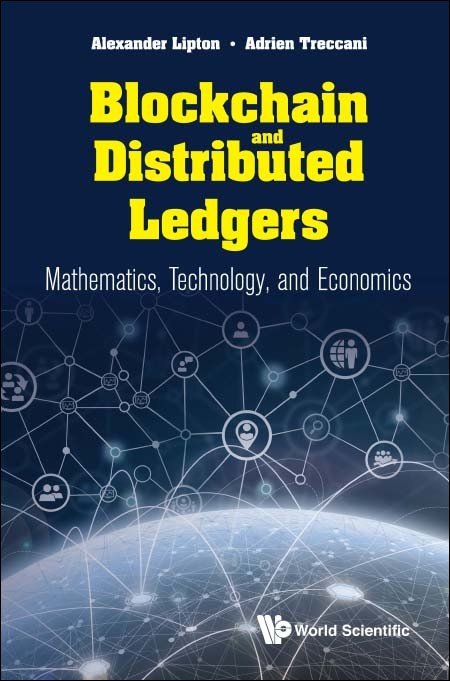Cookies Notification

|
System Upgrade on Tue, May 28th, 2024 at 2am (EDT)
Existing users will be able to log into the site and access content. However, E-commerce and registration of new users may not be available for up to 12 hours.For online purchase, please visit us again. Contact us at customercare@wspc.com for any enquiries.

Blockchain and Distributed Ledgers
- By (author):
- Alexander Lipton (Sila Money, USA & Hebrew University of Jerusalem, Israel) and
- Adrien Treccani (METACO, Switzerland)
This ebook can only be accessed online and cannot be downloaded. See further usage restrictions.
This textbook focuses on distributed ledger technology (DLT) and its potential impact on society at large. It aims to offer a detailed and self-contained introduction to the founding principles behind DLT accessible to a well-educated but not necessarily mathematically oriented audience. DLT allows solving many complicated problems arising in economics, banking, and finance, industry, trade, and other fields. However, to reap the ultimate benefits, one has to overcome some of its inherent limitations and use it judiciously. Not surprisingly, amid increasing applications of DLT, misconceptions are formed over its use. The book thoroughly dispels these misconceptions via an impartial assessment of the arguments rooted in scientific reasoning.
Blockchain and Distributed Ledgers: Mathematics, Technology, and Economics offers a detailed and self-contained introduction to DLT, blockchains, and cryptocurrencies and seeks to equip the reader with an ability to participate in the crypto economy meaningfully.

Sample Chapter(s)
Preface
Chapter 1: Background
Related Link
Contents:- Background
- The Global Financial System and its Pain Points
- A Primer on Cryptocurrencies and Distributed Ledgers
- Essential Cryptographic Tools
- Bitcoin — A Deep Dive
- Ethereum — A Distributed World Computer?
- Ripple — A Simple Solution to a Complex Problem?
- Central Bank Digital Currencies and Stablecoins
- Wallets and Key Management
- Cryptocurrencies and Quantitative Finance
- Current Research Topics
- Present and Future of DLT
FRONT MATTER
- Pages:i–xlv
https://doi.org/10.1142/9789811221538_fmatter
The following sections are included:
- Dedication
- About the Authors
- Contents
- List of Figures
- List of Tables
- List of Abbreviations
- Preface
CHAPTER 1: Background
- Pages:1–14
https://doi.org/10.1142/9789811221538_0001
The following sections are included:
- Introduction
- Distributed ledgers in a nutshell
- A retrospective view
- A perspective view
- Book’s structure
- Summary
- Further reading
CHAPTER 2: The Global Financial System and its Pain Points
- Pages:15–47
https://doi.org/10.1142/9789811221538_0002
The following sections are included:
- Introduction
- Money in retrospective and perspective
- The role of money
- Money as objects
- Paper money
- Anti-counterfeiting measures
- Money as records
- Money and inflation
- BIS taxonomy of money
- Where does money come from?
- How the financial system operates at the moment
- Current situation
- Challenges faced by the current financial system
- Detailed analysis of money creation
- Negative interest rates
- Banking regulations and monetary stability
- The pros and cons of the current system
- Domestic payments
- The protagonists
- Settlement
- Credit card payments
- Cross-border payments
- Cross-border transactions and correspondent banking
- Forex trading
- Informal funds transfer systems
- Blockchain payments
- Summary
- Exercises
CHAPTER 3: A Primer on Cryptocurrencies and Distributed Ledgers
- Pages:49–77
https://doi.org/10.1142/9789811221538_0003
The following sections are included:
- Introduction
- Distributed identity
- Legal identification
- Digital identification and wallets
- Decentralized network
- Client-server model
- Peer-to-peer model
- Network nodes
- Bootstrapping of a node
- Distributed ledger
- Permissioning framework
- Blockchain data structure
- Double spending
- Illustration in a centralized setup
- Illustration in a decentralized setup
- Network consensus
- Sybil attacks
- Digital work with a proof-of-work
- Building the chain
- Block rewards and miners
- A computational power race
- Difficulty under competition
- Forks and consensus chain
- The 51% attack
- Confirmations and finality
- The limits of proof-of-work
- Staking as an alternative to working
- Path to the after-Bitcoin
- Pizza day
- Silk Road
- Altcoins
- Ethereum and smart contracts
- Tokenization
- Initial coin offerings
- Decentralized finance and autonomous organizations
- Summary
- Exercises
CHAPTER 4: Essential Cryptographic Tools
- Pages:79–143
https://doi.org/10.1142/9789811221538_0004
The following sections are included:
- Introduction
- Symmetric key cryptography
- Introduction
- Caesar’s cipher
- Affine cipher
- A simple substitution cipher
- The Vigenère cipher
- The Enigma machine
- A one-time pad
- A stream cipher
- Data encryption standards
- Asymmetric key cryptography
- Introduction
- Cryptographic one-way functions
- Abstract encryption-decryption algorithm
- Abstract digital signature algorithm
- Abstract secret-sharing algorithm
- Elements of number theory
- The set of integers modulo n
- The Euclidean algorithm
- The extended Euclidean algorithm
- Fermat’s little theorem
- Euler’s theorem
- Finite ring cryptography
- Modular exponentiation
- A good trapdoor function?
- A good trapdoor function!
- RSA encryption-decryption algorithm
- RSA digital signature algorithm
- Blind digital signature algorithm
- Chaum’s anonymous cash
- Finite field cryptography
- Definitions
- Primitive roots
- ElGamal encryption algorithm
- ElGamal digital signature algorithm
- Schnorr digital signature algorithm
- Diffie-Hellman key exchange
- Elliptic Curve Cryptography
- Continuous elliptic curves
- Historical aside
- Addition on elliptic curves
- Projectivization of elliptic curves
- Multiplication on elliptic curves
- Discrete elliptic curves
- The discrete log problem on elliptic curves
- The standard elliptic curve secp256r1
- Elliptic curve digital signature algorithm
- Elliptic curve Schnorr digital signature algorithm
- Diffie-Hellman key exchange
- Comparison of different digital signature algorithms
- Cryptographic hash functions
- Hash functions
- Collision-resistant hash functions
- Signatures and hash functions
- Signatures and birthday attacks
- The random oracle hash
- A practical hash function
- Search puzzles and hash functions
- Other uses of cryptographic hash functions
- Iterative hash function with padding
- Secure hash algorithms
- Background
- MD5
- SHA-256
- RIPEMD-160
- Merkle trees and hash pointers
- Merkle trees
- Hash pointers and chain signatures
- Chain signatures combined with Merkle trees
- Quantum-resistant cryptography
- Summary
- Exercises
CHAPTER 5: Bitcoin — A Deep Dive
- Pages:145–203
https://doi.org/10.1142/9789811221538_0005
The following sections are included:
- Introduction
- Bitcoin addresses
- Transactions
- Distributed ledger accounting
- Bitcoin transactions and mathematical induction
- Transaction structure
- Transaction scripts
- Transaction verification
- Representative transactions
- Transaction broadcast
- The Coinbase transaction
- The Bitcoin ecosystem
- Full node
- Simplified payment verification node
- Wallet
- Solo miners
- Mining pools
- Exchanges
- Bitcoin tumblers or mixers
- Mining
- Consensus
- How Bitcoin rewards miners?
- How do miners mine?
- Mining difficulty
- Pooling of resources
- Malicious attacks
- Soft and hard forks
- Growing blockchain by induction
- Anatomy of Block 600,000
- Bitcoin pros and cons
- Summary
- Exercises
CHAPTER 6: Ethereum — A Distributed World Computer?
- Pages:205–232
https://doi.org/10.1142/9789811221538_0006
The following sections are included:
- Introduction
- Similarities and differences between Bitcoin and Ethereum
- A more centralized protocol?
- Ethereum account types
- The Ethereum Virtual Machine
- Transfers and smart contract calls
- Consensus
- Smart contracts
- Definitions
- Example — A forward contract
- Advantages and disadvantages of smart contracts
- Oracles
- Applications of Ethereum smart contracts
- Potential use cases
- Tokens and token standards
- Crowdfunding via initial coin offerings
- Stablecoins
- Automated market makers
- Decentralized autonomous organizations
- Summary
- Exercises
CHAPTER 7: Ripple — A Simple Solution to a Complex Problem?
- Pages:233–242
https://doi.org/10.1142/9789811221538_0007
The following sections are included:
- Introduction
- Ripple protocol
- Applications
- Summary
- Exercises
CHAPTER 8: Central Bank Digital Currencies and Stablecoins
- Pages:243–260
https://doi.org/10.1142/9789811221538_0008
The following sections are included:
- Introduction
- Narrow banks
- A brief history
- Possible designs of a narrow bank
- CBDC
- Central banks as issuers of CBDC
- Narrow banks as issuers of CBDC
- Technical considerations
- Stablecoins
- Background
- Stablecoins fully collateralized with fiat
- Coins partially collateralized with fiat
- Coins (over)collateralized with crypto
- Dynamically stabilized coins
- Digital trade coins collateralized with assets
- General considerations
- How to build a DTC
- Summary
- Exercises
CHAPTER 9: Wallets and Key Management
- Pages:261–289
https://doi.org/10.1142/9789811221538_0009
The following sections are included:
- Introduction
- General wallet architecture
- Necessary components
- Network node
- Blockchain indexer
- Wallet application
- Keystore
- Wallet genesis
- Key space
- Brain wallet
- The need for entropy
- A concrete collision attack
- True random number generators
- Deterministic key derivation
- The need for multiple keys
- The original Bitcoin Core approach
- BIP32
- BIP44
- Extensions to BIP32
- From mnemonic to seed
- Export and human-readability
- BIP39
- The relativeness of security
- Custodial wallet services
- A practical example
- The Binance hack
- The QuadrigaCX fraud
- Key isolation and transaction approval
- Security ingredients
- Hot and cold storage
- Four-eyes principle
- Off-chain validation
- On-chain validation
- Multi-party computation
- Summary
- Exercises
CHAPTER 10: Cryptocurrencies and Quantitative Finance
- Pages:291–353
https://doi.org/10.1142/9789811221538_0010
The following sections are included:
- Introduction
- Can cryptocurrencies be viewed as money?
- Do fair prices of cryptocurrencies exist?
- Distribution of daily BTC returns
- Distribution of yearly BTC returns
- The Fourier transform
- Monte Carlo simulations
- Distribution of daily ETH, XRP, and MRKT returns
- Comparative statistics of cryptocurrency returns
- Cryptocurrency ecosystem and its ecology
- BTC valuation models
- Bitcoin dominance index
- The SIR model
- The SIS model
- Automated market makers
- Summary
- Exercises
CHAPTER 11: Current Research Topics
- Pages:355–375
https://doi.org/10.1142/9789811221538_0011
The following sections are included:
- Introduction
- Intra- and interoperability
- Background
- Intraoperability
- Interoperability
- Privacy
- Background
- Payment channels
- Coin mixing
- Built-in cryptographic obfuscation
- Scalability trilemma
- Background
- Current transactional banking model: scalable + secure
- Current crypto model: decentralized + secure
- Future fintech model: decentralized + scalable + secure
- Summary
- Exercises
CHAPTER 12: Present and Future of DLT
- Pages:377–405
https://doi.org/10.1142/9789811221538_0012
The following sections are included:
- Introduction
- Financial Services
- Accounting and audit
- Global payments
- Progammable money
- Regulations
- Trade execution, clearing and settlement
- Government
- Identity
- Voting
- Healthcare
- Electronic health records system
- Research
- Supply chain
- Supply chain
- Supply chain management
- Trade finance
- Tokenization of real assets
- Summary
- Exercises
BACK MATTER
- Pages:407–434
https://doi.org/10.1142/9789811221538_bmatter
The following sections are included:
- Bibliography
- Name Index
- Subject Index
"At last — if you want to truly understand distributed ledger technology and its implications for payments, here finally is an authoritative and accessible reference book. No polemics, breathless praise, or impenetrable prose — the authors impartially explain how DLT works and how it can be used to upgrade our outdated payment systems. Along the way, the authors delight the reader with fascinating historical details and many practical applications. This book has instantly become the definitive source."
The Adams Distinguished Professor of Management and
Professor of Finance, Stanford University
"An amazing tour-de-force, and a must-read for anyone hoping to build distributed ledger systems for financial transactions. Good material for both students and experts alike."
Toshiba Professor, MIT
"This is an excellent introduction to DLT which is not just credible and insightful for advanced students trained in quantitative fields — but also very accessible for the general reader with limited knowledge of math or cryptography. As the book so aptly explains, there are at least two big challenges for anybody who seeks to understand the key principles of DLT: the field is dominated by 'zealots or their arch enemies' and the subject requires a good knowledge of cryptography, game theory and economics — three separate skills rarely taught in combination.
However, the book aims for a 'balanced and well-reasoned discourse' — which it delivers in style — and it succinctly and effectively covers all three of the key elements of knowledge that need to be grasped to understand how DLT works.
It is thus a tour de force! It should be required reading for regulators, finance practitioners, investors and economists, particularly given that DLT will almost certainly reshape the future financial system."
Chair Editorial Board, Editor-at-large, US
The Financial Times
"Regardless of your views on cryptocurrencies, any modern practitioner of finance should be familiar with distributed ledger technology (DLT). Professor Alex Lipton and Adrien Treccani have written a fascinating tractatus that answers fundamental questions about the nature of money. They effectively demonstrate the intrinsic value offered by DLT, as the solution to many of the problems that have plagued financial systems for centuries. If there is one book that everyone should read on DLT, this is the one."
Global Head — Quantitative Research and Development
Strategy & Planning, Abu Dhabi Investment Authority
"We are just at the tip of the iceberg when it comes to the disruptive potential of DLT. Trillions of dollars of value will be created over the coming decades as entrepreneurs find ways to capitalize on the technology to democratize finance and wealth management. This comprehensive book from Alex Lipton and Adrien Treccani provides a powerful place to start exploring the DLT opportunity as well as a definitive reference to those already active in the space. The book is unique in its balanced and well-rounded approach."
Avaloq Founder and serial entrepreneur
"A very well-researched and rounded tour d'horizon of the brave new world of Blockchain, crypto and the technology's impact on how we will transfer ownership and value in the future. Alex and Adrien strike the right balance between academic rigor and practical relevance. A highly recommended read for both industry newcomers as well as veterans."
Co-Founder & Group CEO, Sygnum
"This book provides comprehensive coverage of the cryptocurrency ecosystem, with lucid explanations of the underlying math, technology, and economics. Technical material is seamlessly integrated with the authors' broad perspective and deep understanding of the past and future of blockchains, digital currencies, and decentralized finance. The book is an essential resource for practitioners and academics."
Jack R Anderson Professor of Business
Columbia University
"Blockchain and Distributed Ledgers is a wonderful book. It is at once what the Russians call a brick, for its size, and what the English call a gem, for its clarity. And it is timely.
The astronomer Carl Sagan says: 'We live in a society exquisitely dependent on science and technology, in which hardly anyone knows anything about science and technology.'
It is this problem Lipton and Treccani are attempting to confront. A comfort, then, that some of our leading mathematicians are among our more discerning philosophers too."
Adjunct Instructor, New York University (NYU)
Interdisciplinary Journal of Economics and Business Law, 2021, Volume 10, Issue 2, pp. 141–143
"Since one of the authors is a well-accomplished mathematician and both authors are diversified practitioners with many years of experience in the blockchain industry, the book offers a unique perspective on digital finance and DeFi. The book is well-balanced with technical details, practical insights and objective views … The target audience of the book includes both practitioners, academics, and anyone looking to develop their knowledge in crypto and digital finance. A remarkable feature of the book is how well it illustrates its figures: a picture is worth a thousand words. Lipton and Treccani provide well-thought-out, illustrative figures and diagrams for almost every concept they discuss. Appropriate detail describing the illustrations helps readers get the most out of the book. I will keep the book as a reference for years to come and I highly recommend the same for anyone involved and interested in the blockchain and crypto industry."
Alexander Lipton is Co-Founder and Chief Information Officer of Sila, Partner at Numeraire, Visiting Professor and Dean's Fellow at the Hebrew University of Jerusalem, and Connection Science Fellow at MIT. Alex is a board member of Sila and an advisory board member of several fintech companies worldwide. In 2006–2016, Alex was Co-Head of the Global Quantitative Group and Quantitative Solutions Executive at Bank of America. Earlier, he was a senior manager at Citadel, Credit Suisse, Deutsche Bank, and Bankers Trust. At the same time, Alex held visiting professorships at EPFL, NYU, Oxford University, Imperial College, and the University of Illinois. Before becoming a banker, Alex was a Full Professor of Mathematics at the University of Illinois and a Consultant at Los Alamos National Laboratory. In 2000 Alex was awarded the Inaugural Quant of the Year Award and in 2021 the Buy-side Quant of the Year Award by Risk Magazine. Alex authored/edited 10 other books and more than a hundred scientific papers. Alex is an Associate Editor of several journals, including Finance and Stochastics, Journal of FinTech, International Journal of Theoretical and Applied Finance, and Quantitative Finance. He is a frequent keynote speaker at Quantitative Finance and FinTech conferences and forums worldwide.
Founder and CEO of METACO, a leading provider of security infrastructure for digital assets, Adrien Treccani is a software engineer specialized in high performance computing and financial engineering. He has been an active member of the fintech community since 2012 and advised numerous banks and financial institutions globally on distributed ledger technology, cryptocurrencies and decentralized finance. Adrien lectures at University of Lausanne and Ecole Polytechnique Fédérale de Lausanne and has published in top peer-reviewed journals including Management Science and the Journal of Financial Econometrics.
Adrien holds a Bachelor degree in computer science and a Master degree in financial engineering at the Ecole Polytechnique Fédérale de Lausanne. He obtained a PhD in mathematical finance at the Swiss Finance Institute and completed a post doctorate in high performance computing at University of Zürich. He worked in the hedge fund industry as a quantitative analyst before founding METACO in 2015.
Sample Chapter(s)
Preface
Chapter 1: Background




